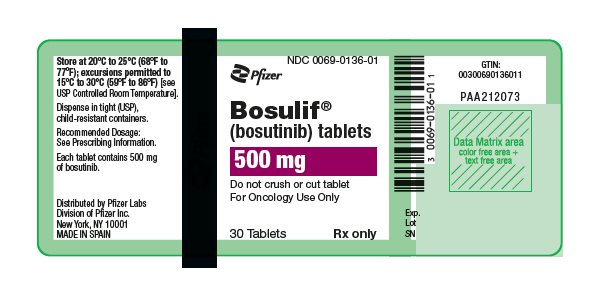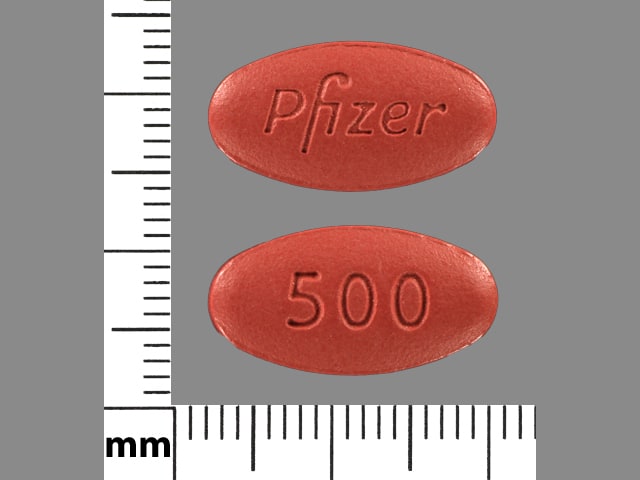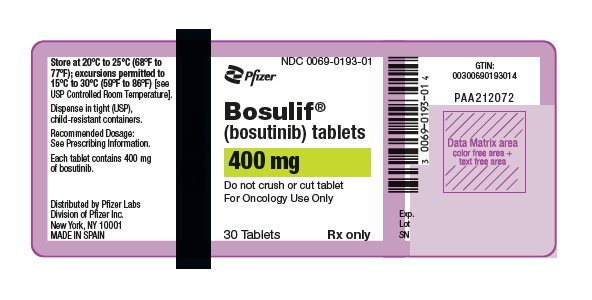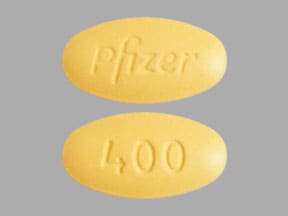Bosulif
Generic name: bosutinib
Drug class: BCR-ABL tyrosine kinase inhibitors
Medically reviewed by A Ras MD.
What is Bosulif?
Bosulif is a prescription medicine that is used to treat a type of leukemia.
Bosutinib is a kinase inhibitor. The chemical name for bosutinib monohydrate is 3-Quinolinecarbonitrile, 4-[(2,4-dichloro-5-methoxyphenyl)amino]-6-methoxy-7-[3-(4-methyl-1-piperazinyl) propoxy]-, hydrate (1:1). Its chemical formula is C26H29Cl2N5O3∙H2O (monohydrate); its molecular weight is 548.46 (monohydrate), equivalent to 530.46 (anhydrous). Bosutinib monohydrate has the following chemical structure:

Bosutinib monohydrate is a white to yellowish-tan powder. Bosutinib monohydrate has a pH dependent solubility across the physiological pH range. At or below pH 5, bosutinib monohydrate behaves as a highly soluble compound. Above pH 5, the solubility of bosutinib monohydrate reduces rapidly.
BOSULIF® (bosutinib) tablets are supplied for oral administration in 3 strengths: a 100 mg yellow, oval, biconvex, film-coated tablet debossed with “Pfizer” on one side and “100” on the other; a 400 mg orange, oval, biconvex, film-coated tablet debossed with “Pfizer” on one side and “400” on the other; and a 500 mg red, oval, biconvex, film-coated tablet debossed with “Pfizer” on one side and “500” on the other.
Each 100 mg BOSULIF tablet contains 103.40 mg of bosutinib monohydrate, equivalent to 100 mg of bosutinib; each 400 mg BOSULIF tablet contains 413.60 mg of bosutinib monohydrate, equivalent to 400 mg of bosutinib; each 500 mg BOSULIF tablet contains 516.98 mg of bosutinib monohydrate, equivalent to 500 mg of bosutinib. The following inactive ingredients are included in the tablets: microcrystalline cellulose, croscarmellose sodium, poloxamer, povidone, magnesium stearate, polyvinyl alcohol, titanium dioxide, polyethylene glycol, talc, and iron oxide yellow (for 100 mg, and 400 mg tablet) and iron oxide red (for 400 mg, and 500 mg tablet).
Mechanism of Action
Bosutinib is a TKI. Bosutinib inhibits the BCR-ABL kinase that promotes CML; it is also an inhibitor of Src-family kinases including Src, Lyn, and Hck. Bosutinib inhibited 16 of 18 imatinib-resistant forms of BCR-ABL kinase expressed in murine myeloid cell lines. Bosutinib did not inhibit the T315I and V299L mutant cells.
Before taking Bosulif, tell your doctor:
- If you are allergic to Bosulif; any part of this medicine; or any other drugs, foods, or substances. Tell your doctor about the allergy and what signs you had.
- If you take any drugs (prescription or OTC, natural products, vitamins) that must not be taken with Bosulif, like certain drugs that are used for HIV, infections, or seizures. There are many drugs that must not be taken with Bosulif.
- If you are taking St. John’s wort. Do not take St. John’s wort with Bosulif. This medicine may not work as well.
- If you are breast-feeding. Do not breast-feed while you take Bosulif and for 2 weeks after your last dose.
This is not a list of all drugs or health problems that interact with this medicine.
Tell your doctor and pharmacist about all of your drugs (prescription or OTC, natural products, vitamins) and health problems. You must check to make sure that it is safe for you to take Bosulif with all of your drugs and health problems. Do not start, stop, or change the dose of any drug without checking with your doctor.
What are some things I need to know or do while I take Bosulif?
- Tell all of your health care providers that you take Bosulif. This includes your doctors, nurses, pharmacists, and dentists.
- You may have more chance of getting an infection. Wash hands often. Stay away from people with infections, colds, or flu.
- You may bleed more easily. Be careful and avoid injury. Use a soft toothbrush and an electric razor.
- Have blood work checked as you have been told by the doctor. Talk with the doctor.
- If you need to take an antacid or a drug like famotidine or ranitidine, talk with your doctor about how to take it while taking Bosulif.
- Avoid grapefruit and grapefruit juice.
- This medicine may affect fertility. Fertility problems may lead to not being able to get pregnant or father a child.
- This medicine may cause harm to an unborn baby. A pregnancy test will be done before you start Bosulif to show that you are NOT pregnant.
- Women must use birth control while taking Bosulif and for some time after the last dose. Ask your doctor how long to use birth control. If you get pregnant, call your doctor right away.
How is Bosulif best taken?
Use Bosulif as ordered by your doctor. Read all information given to you. Follow all instructions closely.
- Take with food.
- Swallow whole. Do not chew, break, or crush.
- Keep taking Bosulif as you have been told by your doctor or other health care provider, even if you feel well.
- You will need to take special care when handling Bosulif. Check with the doctor or pharmacist to see how to handle Bosulif.
- If the tablet is crushed or broken, do not touch the contents. If you do touch the contents or get it in your eyes, wash hands or eyes right away.
What do I do if I miss a dose?
- Take a missed dose as soon as you think about it, with food.
- If it has been 12 hours or more since the missed dose, skip the missed dose and go back to your normal time.
- Do not take 2 doses at the same time or extra doses.
What are the side effects of Bosulif that I need to call my doctor about immediately?
WARNING/CAUTION: Even though it may be rare, some people may have very bad and sometimes deadly side effects when taking a drug. Tell your doctor or get medical help right away if you have any of the following signs or symptoms that may be related to a very bad side effect:
- Signs of an allergic reaction, like rash; hives; itching; red, swollen, blistered, or peeling skin with or without fever; wheezing; tightness in the chest or throat; trouble breathing, swallowing, or talking; unusual hoarseness; or swelling of the mouth, face, lips, tongue, or throat.
- Signs of infection like fever, chills, very bad sore throat, ear or sinus pain, cough, more sputum or change in color of sputum, pain with passing urine, mouth sores, or wound that will not heal.
- Signs of bleeding like throwing up or coughing up blood; vomit that looks like coffee grounds; blood in the urine; black, red, or tarry stools; bleeding from the gums; abnormal vaginal bleeding; bruises without a cause or that get bigger; or bleeding you cannot stop.
- Signs of liver problems like dark urine, feeling tired, not hungry, upset stomach or stomach pain, light-colored stools, throwing up, or yellow skin or eyes.
- Signs of kidney problems like unable to pass urine, change in how much urine is passed, blood in the urine, or a big weight gain.
- Passing urine more often.
- Feeling very tired or weak.
- Chest pain.
- This medicine may cause you to swell or keep fluid in your body. Tell your doctor if you have swelling, weight gain, or trouble breathing.
What are some other side effects of Bosulif?
All drugs may cause side effects. However, many people have no side effects or only have minor side effects. Call your doctor or get medical help if any of these side effects or any other side effects bother you or do not go away:
- Headache.
- Feeling dizzy, sleepy, tired, or weak.
- Stomach pain.
- Joint pain.
- Back pain.
- Signs of a common cold.
- Nose or throat irritation.
- Diarrhea, throwing up, upset stomach, and feeling less hungry are common with Bosulif. If these happen, talk with your doctor about ways to lower these side effects. Call your doctor right away if any of these effects bother you, do not get better, or get very bad.
These are not all of the side effects that may occur. If you have questions about side effects, call your doctor. Call your doctor for medical advice about side effects.
You may report side effects to the FDA at 1-800-332-1088. You may also report side effects at https://www.fda.gov/medwatch.
If overdose is suspected:
If you think there has been an overdose, call your poison control center or get medical care right away. Be ready to tell or show what was taken, how much, and when it happened.
How do I store and/or throw out Bosulif?
- Store at room temperature.
- Store in a dry place. Do not store in a bathroom.
- Keep all drugs in a safe place. Keep all drugs out of the reach of children and pets.
- Throw away unused or expired drugs. Do not flush down a toilet or pour down a drain unless you are told to do so. Check with your pharmacist if you have questions about the best way to throw out drugs. There may be drug take-back programs in your area.
Label
PRINCIPAL DISPLAY PANEL – 500 MG BOTTLE LABEL
- Pfizer
- NDC 0069-0136-01
- Bosulif®
(bosutinib) tablets - 500 mg*
- Do not crush or cut tablet
For Oncology Use Only - 30 Tablets
- Rx only


PRINCIPAL DISPLAY PANEL – 400 MG TABLET BOTTLE LABEL
- Pfizer
- NDC 0069-0193-01
- Bosulif®
(bosutinib) tablets - 400 mg*
- Do not crush or cut tablet
For Oncology Use Only - 30 Tablets
- Rx only


SRC: NLM .
